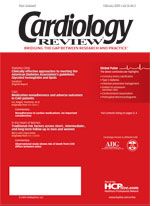Publication
Article
Cardiology Review® Online
Exaggerated blood pressure responses during mental stress and carotid atherosclerosis progression
Jennings and Kamarck (page 28) prospectively studied the progression of carotid artery atherosclerosis in a cohort of patients from the Kuopio Ischemic Heart Disease (KIHD) study. The original KIHD study was an epidemiologic investigation conducted over a 5-year period (1984—1989) that evaluated cardiovascular risk factors in 2,682 men from Kuopio, Finland. In this study, 756 men were followed up for assessment of intima-media thickness (IMT) through the common carotid arteries by high-resolution B-mode ultrasonography at baseline, 4 years, and 11 years. The mean IMT, the maximum IMT, and the plaque height (defined as the difference between maximum and minimum thickness) were reported.
An automated test sequence composed of four standardized computer-based tasks that evaluated memory and reaction time, including a computerized version of the Stroop Color-Word Task, was used as a measure of cardiovascular reactivity. The level of difficulty was adjusted to maintain a success rate of approximately 60%. Automated measurements of blood pressure and heart rate were taken in the dominant arm at 90-second intervals. Regression of blood pressure and heart rate responses on IMT were calculated, with adjustments being made for age and educational level, two factors known to influence cardiovascular responses.
As expected, IMT increased over the 7-year period. When analyzed as a function of systolic blood pressure, the mean carotid IMT was 0.035 mm thicker for each standardized unit of change in systolic blood pressure induced by mental stress, which was approximately 7 mm Hg. The association persisted in a subsample
of 195 patients who had no known cardiovascular disease, including hypertension, and who did not take any cardiac medications. Each standardized unit of change in systolic blood pressure response to mental stress was associated with a 7-year progression of 0.02 mm of thickening. Smoking status did not affect the association statistically.
To examine psychological stress, Jennings and Kamarck used tasks of varying difficulty to determine cardiovascular responses. Although this method may create mental stress in a controlled setting, it fails to simulate the unpredictable nature of everyday life. Furthermore, responses to these tasks may simply be surrogate markers of the subject’s underlying personality.1 Associations between type A personality and exaggerated cardiovascular responses to laboratory tasks have been demonstrated.2 Conversely, submissive, type B behavior was protective against both nonfatal and fatal myocardial infarctions (MI), mainly in women.3 The current study falls short of evaluating the clinically relevant end points, such as MI and mortality. Previous studies have documented an increased risk of acute MI for each 0.1-mm increment in carotid IMT.4 Although the study by Jennings and Kamarck is suggestive, it remains unclear whether the observed 0.02-mm increase in IMT per standardized unit change in systolic blood pressure would lead to any increase in acute MI or mortality in this population.
Causal links between psychological stress and MI in humans have been difficult to demonstrate.5 Limited animal studies have demonstrated positive results similar to this study. Manuck and colleagues studied the development of atherosclerosis with respect to heart rate responses to a standardized stress in monkeys on an atherogenic diet.6 The animals were categorized as high and low reactors based on heart response. Coronary intimal lesions were found to be twice as extensive in the high-reactor group. The use of beta blockade with a 20% heart rate reduction in the high-reactor group led to a statistically significant decline in atherosclerosis.7 This suggests that the physiologic responses triggered by stressor events (ie, adrenergic or other biochemical mediators are released) enhance atherosclerosis. Observational studies have shown that psychologic stress is associated with an acceleration of coronary artery disease (CAD).8 Biochemical parameters linking acute stress exposure to CAD have been identified, including interleukins, such as interleukin-1 beta and interleukin-2, and intercellular cell adhesion molecule-1. Stress may further enhance CAD risk through upregulation of the renin-angiotensin-aldosterone hormonal axis, direct endothelial damage, and aggravation of common risk factors, such as smoking, hypertension, and hypercholesterolemia.9
If the increased risk of CAD with hard end points, including MI, can be demonstrated in human subjects with higher reactor response, the traditional CAD risk factors may need to be treated more aggressively in this subset. This study should be applauded for contributions in this arena, where information is still scarce. Further long-term studies using clinical end points such as MI and mortality are still required.






